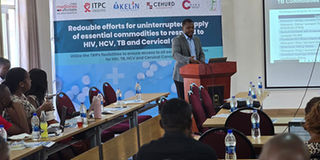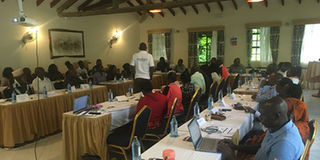Unlocking the potential of long-acting prevention tools in promoting health as a human right
Sponsored by KELIN

Engaging with stakeholders from the Ministry of Health, civil society organisations and community members during a Market and Patent Intelligence study finding validation on access to HIV medicine.
By Duke Otieno
Kenya stands at a critical juncture in the fight against HIV. Despite remarkable strides in treatment, challenges in prevention persist, with about 35,000 new infections occurring annually, and 41 percent of these being adolescent and young people aged 15-24 years.
An estimated 1.4 million people live with HIV in Kenya, underscoring the need for innovative solutions that address the diverse requirements of those most vulnerable to the epidemic.
Among key populations, the most affected are sex workers, showing an infection rate of 30 percent, and men who have sex with men at 18 percent.
At the centre of the required response is the principle that access to healthcare services, including life-saving innovations, is a fundamental human right.
The Kenya Legal and Ethical Issues Network on HIV and AIDS (KELIN) has been at the forefront of advocacy to ensure equitable access to lifesaving long-acting prevention tools, positioning these interventions as game-changers in the nation’s HIV response.
Innovative tools like the Cabotegravir Long-Acting (CAB-LA) injection and the ground-breaking Lenacapavir, offer an unparalleled promise in the HIV prevention landscape.
CAB-LA, a one in two months injectable PrEP tool, addresses adherence challenges associated with daily oral pills. Similarly, Lenacapavir, a biannual injection with dual utility in prevention and treatment, provides a pathway for significantly reducing new HIV infections and improving health outcomes for those with HIV.
Despite their efficacy and the convenience they provide, access to these innovative tools remains constrained in Kenya. Challenges such as intellectual property barriers, high costs, slow regulatory processes and limited health infrastructure, hinder their widespread adoption. KELIN’s recent study on HIV prevention tools revealed that these barriers bring inequities in healthcare access, hence affecting underserved populations.
For vulnerable populations in particular, this constitutes a violation of the right to health that is enshrined in the Constitution of Kenya under the Bill of Rights, specifically at Section 43(1a). The Section states that every person has the right to the highest attainable standard of health, which includes the right to health care, including reproductive health care.
To address these challenges, KELIN took a proactive approach by engaging with key regulatory stakeholders. Letters were sent to the Pharmacy and Poisons Board (PPB) and the National AIDS and STI Control Programme (NASCOP), inquiring about the status of CAB-LA and Dapivirine Ring registration and roll-out in Kenya. These communications emphasised the urgency of incorporating CAB-LA into Kenya’s prevention programmes, and sought clarity on plans to make it available in public health facilities. The responses from these entities will be instrumental in charting the path toward access and integration.
In September 2024, Gilead issued a voluntary license for Lenacapavir, marking a significant step toward making this life-saving tool accessible in low and middle-income countries, including Kenya. The voluntary license paves the way for generic manufacturers to produce affordable versions of Lenacapavir, addressing a critical affordability barrier. However, further advocacy is required to ensure timely regulatory approval and integration into Kenya’s health systems.
At the county level, steps are being taken to address the persistent challenge of siloed service delivery. Counties like Homa Bay have begun integrating HIV and TB services into outpatient care. This approach not only enhances service efficiency, but also reduces stigma and increases access for clients who require multiple health interventions. Community dialogues facilitated by KELIN have highlighted the importance of such integration, particularly for reaching key populations and underserved communities.

A community dialogue in Machakos County, on addressing barriers to the uptake of HIV prevention tools.
Over the past year, KELIN has convened critical dialogues with policymakers, civil society organisations (CSOs), healthcare providers, and community representatives. These forums provided an opportunity to disseminate findings from the HIV prevention tools study, including the barriers to access and strategies for addressing them.
Recommendations from these meetings emphasised on leveraging TRIPS flexibilities to overcome intellectual property barriers like what just happened on Lenacapavir injection voluntary license; advocating for policy reforms to prioritise long-acting prevention tools in national HIV prevention strategies; ensuring sustained financing for the long-acting prevention tools through government budgets and donor support, which can only be made possible after inclusion in the national treatment guidelines; and educating communities to increase awareness and stop stigma surrounding new prevention tools.
As part of the commemoration of World AIDS Day 2024, KELIN renews its call for a unified response to integrate the long-acting prevention tools into the national HIV prevention framework. The steps taken include engaging regulators, leveraging voluntary licenses, and advocating for integrated services.
The integration of long-acting prevention tools such as CAB-LA, Dapirivine Ring and Lenacapavir, combined with the adoption of efficient service delivery models, will not only strengthen Kenya’s HIV response but also serve as a blueprint, besides acting like the cornerstone of broader health equity initiatives.
KELIN reaffirms its commitment to advancing health as a human right. We invite all stakeholders from government institutions, civil society, private sector and communities to join hands in ensuring that every Kenyan has access to the tools needed to prevent and treat HIV.
With about 75 percent of Kenyans relying on public health facilities for care, expanding access to CAB-LA, Dapivirine ring and Lenacapavir through public programmes is essential to achieving universal health coverage. Together, we can transform health systems, overcome barriers, and secure a healthier, more inclusive future for all.
__________________
Duke Otieno is KELIN’s Advocacy Officer for HIV and TB. ([email protected])
https://www.kelinkenya.org | @KelinKenya


